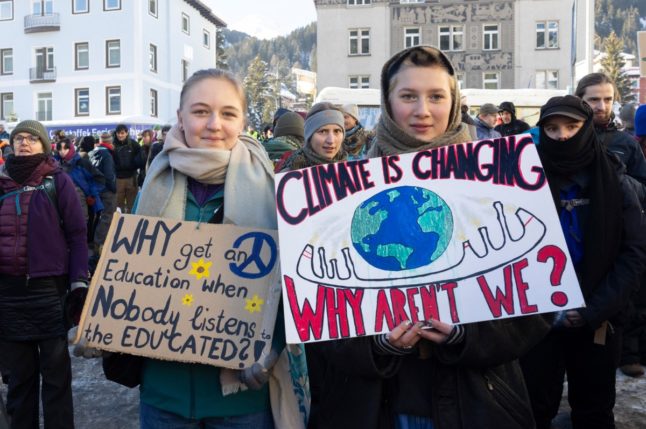1971: This is year when women in Switzerland were finally granted women the right to vote at the national level.
Though it wasn’t quite the last country in Europe to do so (Liechtenstein held out 1984), it was decades after most of the western world and a full 78 years after New Zealand became the first country to grant women’s suffrage in 1893.
EXPLAINED: What happened after Swiss women got the right to vote in 1971?
At the cantonal level, Vaud and Neuchâtel became the first to give women the right to vote in 1959. However, women in the conservative eastern Swiss canton of Appenzell Innerrhoden had to wait until 1990.
12 percent: This is how much more men earned than women in 2016 across all professional levels in both the public and private sectors, according to the Swiss Federal Statistics Office.

For top, upper and middle management this gender pay gap was even higher – at 18.54 percent. Among staff with no management functions, it was eight percent.
A total of 57.1 percent of the overall wage gap (18.3 percent) between men and women in 2016 could be explained by factors including the different duties carried out by women in the workplace, differing levels of responsibility for men and women, and wage differences between industries.
However 42.9 percent of the wage gap could not be explained by these factors.
Read also: How women are losing out in lucrative Swiss banking sector
In terms of actual wages, in 2016, 16.5 percent of women earned less than 4,000 Swiss francs (€3,570) a month after tax, against 5.3 percent of men. By contrast, 26.1 percent of men earned 8,000 francs or more compared to 13.8 percent of women who earned that amount.
14 weeks: This is how much maternity leave Swiss mothers are entitled too. Women receive 80 percent of their salary up to a maximum of 196 francs a day.
Swiss maternity leave was finally introduced in 1995 but only after four previous referendums on the issue failed.
32 percent:This is the percentage of women in the Swiss lower house of parliament, the National Council. Meanwhile, just 15.2 percent of Swiss senators are women.

Swiss Defence Minister Viola Amherd and Justice Minister Karin Keller-Sutter are both members of the Federal Council as at 2022. Photo: AFP
As at 2022, there are three women in the seven-member Swiss government, known as the Federal Council.
85.4 years: This is the life expectancy of girls born in Switzerland in 2017, up from 82.1 ten years earlier and four years longer than the life expectancy of 81.4 years forecast for boys born in 2017.
In addition, one in four girls born in 2017 are predicted to live to be 100. For men, that number is one in eight.
Meanwhile, the life expectancy for women who had already reached the age of 65 in 2017 was an average 22.5 years against 19.7 years for men.
22.2 percent:This is the number of Swiss women aged 16 and over who have been sexually assaulted according to a recent survey commissioned by Amnesty International.
However, only 11 percent of those women said they had contacted sexual assault victims’ services and just 10 percent said they had gone to the police.
The survey also found high rates of sexual harassment in Switzerland, with 59 percent of women saying they had experienced unwelcome touching, hugging and kissing.
23 percent: Women hold just 23.6 percent of all decision-making roles in the country’s firms, a recent study into 900,000 Swiss firms from 2008 to 2018 revealed.
The gender imbalance is ever more marked on company boards. Only 16.68 percent of seats on the boards of Swiss limited companies are filled by women and that drops to less than one in ten (8.9 percent) for board presidents.
By comparison, 21.1 percent of board positions were held by women in Germany in 2015. That figure was 34 percent in France and 22.8 percent in the UK, according to a 2016 Credit Suisse report.
Ready for the women‘s strike! ✊?? #frauenstreik2019 #feminism #womensrights #womenempowerment #equalitynow #gleichstellung #frauenkampftag @FrauenstreikZ @FemmesSPFrauen @FrauenstreikCH pic.twitter.com/dkcg4L8PR2
— Nicole Nickerson (@n_nickerson93) June 9, 2019
1981: In 1981 gender equality and equal pay for equal work was written into the Swiss constitution.
Four years later in 1985, women were granted equal rights with men within family life after 54.7 percent of Swiss voters approved legal changes in a referendum.
Read also: 13 milestones in the history of women’s rights in Switzerland
Until this date men technically had legal authority over their wives, meaning a husband could prevent his wife from working, choose where she should live and manage her money, including preventing her from opening a bank account without his approval.
30.7 years: This was the mean age of women when they had their first child in Switzerland in 2016 compared to an EU mean of 29 that year.
The Swiss 2016 mean was also slightly up from the country’s 2008 figure of 29.7.
But to get a better idea of long-term changes here, in 1970, 33.1 percent of all children born in Switzerland were born to mothers aged under 25. By 2016, that figure had fallen to just 6.4 percent.
And in 1970, just 31.1 percent of babies were born to mothers aged 30 and over. In 2016, the percentage was 60.5 percent.
65.1 percent: The latest Swiss figures on housework come from 2013. They show that women are chiefly responsible for housework in nearly two thirds of all Swiss households containing couples.
Tomorrow, women* in Switzerland will go on strike. Female political scientists across Switzerland will join it to highlight the underrepresentation and invisibility of women, the gender wage gap, the devaluation of our work, discrimination, and/or other faces of gender inequality pic.twitter.com/Ey0q8xD24b
— Yanina Welp (@Welpita) June 13, 2019
For couples with children, however, the split is even less equal with women chiefly responsible for doing the household chores in more than 70 percent of these households.
Men were more likely to do their share when the children were younger, but their level of engagement dropped off as children got older.
42.3 percent:This is the number of women aged 25 to 34 in Switzerland who held tertiary qualifications in 2018. This figure was just 9.8 percent in 1999.
In fact, women have overtaken men on this front. In 2018, 34.7 percent of men in Switzerland had a tertiary qualification. Women are also increasingly studying what were once considered male subjects such as maths, statistics and natural sciences.
Read also: Swiss women to strike for equal rights in historic protest



 Please whitelist us to continue reading.
Please whitelist us to continue reading.
Member comments